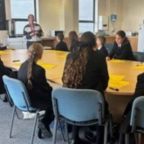
How can students get practical financial knowledge?
Before teaching the student about financial knowledge, the primary thing you have to ask yourself is, “what do they need to know?” There are several financial decisions that a regular secondary school age student is looking to make. Most of their choices are with respect to purchasing a vehicle for transportation, moving from home, and perhaps seeking after an advanced education alternative. Financial education for understudies, at that point, is best centered around these aspects. From living on a noodle diet to maintaining numerous sources of income while in school, students are notably desperate for money. In any case, while you may need to ration to make a decent living, your financial future might be promising, and sooner than you might see it, especially in the event that you begin receiving brilliant money-related knowledge early during your school years. The richest people in the world such as Warren Buffett often wonder why students are not educated on financial literacy during their high school years. This is because financial literacy is very important and they will need this knowledge as long as they live. In fact, many entrepreneurs have stressed on the fact that financial education should be included in the studies curriculum in all educational institutions.
What is financial literacy?
Before discussing how students can get practical financial knowledge, it is important to first understand the concept. The capacity to use information and aptitudes to oversee financial assets viably for a lifetime of money related prosperity comes from understanding the basics of finances. Sadly, while most Americans and the rest of the world are focused on saturating in students with key abilities like math, reading, and writing, education about money-related subjects are woefully dismissed.
Studies concerning financial knowledge across several nations have demonstrated that most people don't comprehend the idea of self-multiplying dividends and a few people don't effectively search out financial data before making certain financial choices. There is always the mismanagement of credit cards by consumers because of lack of financial know-how, business planning and retirement.
Tips for financial literacy
While numerous individuals need money related proficiency, undergrads might be among the most exceedingly terrible. Truth be told, as per an ongoing report by the U.S. Bank, not exclusively do numerous students not have a spending plan or spare, however many can't separate monetary myths from facts. While simply under half 49% of undergrads scored C's when approached to review their financial management abilities. Just 11% score A's, while 5% self-detailed themselves as coming up short. Which makes one wonder: How would students be able to begin planting their own productive financial tree?
Investment literacy
This particular case is rather simple for most people. It may seem like this type of knowledge is hiding behind a paywall, but it honestly isn’. Most financial companies publish dozens of articles about key factors about the financial markets. For example, even a relatively small company like the Axiory broker has a full academy dedicated to educating not only their customers but anybody who would visit their website.
It’s about knowing where to look and knowing which website would provide the best information. The financial industry learned a long time ago that marketing their services to a customer base that knows nothing about the markets is pointless. So they first educate and then launch their ads.
Take an individual account course
Specialists state children should start getting knowledge about financial proficiency from home.
Be that as it may, on the grounds that it's not being taught doesn't mean there are no methods through which one can acquire such knowledge. Numerous schools and colleges are venturing up and offering programs intended to instruct students on the most proficient method to deal with their finances, including money management tips. Furthermore, regardless of whether your school doesn't offer financial education programs, you're not unlucky because of the bulk of financial literacy and money management programs accessible online.
Comprehend the significance of beginning early
There's no better use of the expression which states that you should not postpone until tomorrow what you can do today, especially with regards to managing finances. Students might not have a great deal to spare, however, it is important for them to start off early. And their money will have enough extra time to grow. Time magazine execs stated that putting something aside for retirement is tied in with expanding progressive profit. Accumulated dividends are profits that grow on itself. Over the decades, your unique commitments will develop exponentially in light of self-multiplying dividends.
Resolve to continue learning
While school and graduate school offer ideal chances to begin learning and applying financial knowledge, financial needs change over time - so should your understanding of the concept. Regardless of whether you're hoping to tend to cut down on your Visa debt or renegotiate a home, subscribing to continuous financial knowledge can assist you with boosting your cash through the entirety of the stages and phases of your life.
Warren Buffett once said that if you don't figure out how to bring in cash while you rest, you will work until you kick the bucket. You don’t want to work till your death bed, do you? Some people even die leaving debts for their family members to pay. This is the reason why financial knowledge is very important for students so that they can start practising early for their benefits to accrue over time.
Why is it important for students to gain financial knowledge?
The results of an absence of financial knowledge can be very extreme. A dominant part of students encounters a type of money related trouble causing a huge effect on their regular daily existences. More than $2 trillion Americans have debt and 30% of people report having no additional money, making it difficult to get away from the weight of living from check to check. On the other hand, turning out to be financial education accompanies various freeing adjustments as knowing how money functions, yet additionally how to make it work for you.




















